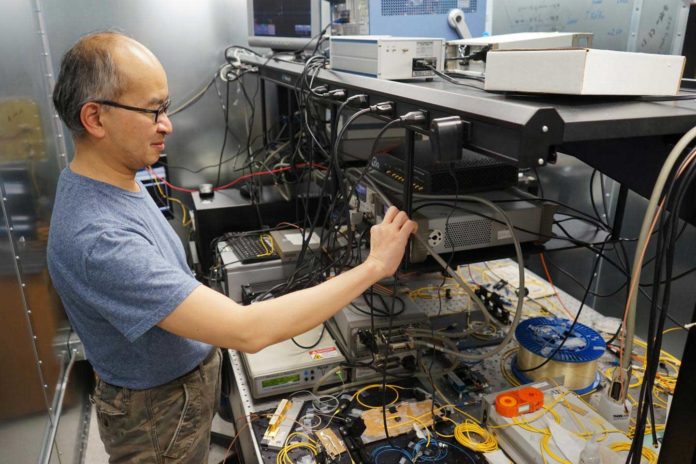Engineers at the University of Toronto have developed a device that could be the backbone of the future of the internet. The device could be a key element for all photonic quantum repeaters, a critical step in long-distance quantum communication.
Today’s Internet was not specifically designed for security, and it shows: hacking, break-ins, and computer espionage are common challenges. Nefarious hackers are constantly poking holes in sophisticated layers of defense erected by individuals, corporations, and governments.
As solutions, scientists have proposed other ways of transmitting data that would leverage key features of quantum physics to provide virtually unbreakable encryption. One of the most promising technologies involves a technique known as quantum key distribution (QKD). QKD exploits the fact that the simple act of sensing or measuring the state of a quantum system disturbs that system.
Until now, such kind of quantum security has been demonstrated in small-scale systems. Toronto scientists are among a group of researchers around the world who are laying the groundwork for a future quantum Internet by working to address some of the challenges in transmitting quantum information over great distances, using optical fiber communication.
Since light signals lose power as they travel long separations through fiber-optic cables, devices called repeaters are embedded at normal interims along the line. These repeaters support and enhance the signs to help transmit the data along the line.
Yet, quantum data is unique, and existing repeaters for quantum data are exceedingly risky. They require the capacity of the quantum information at the repeater destinations, making the repeaters substantially more mistake inclined, hard to manufacture, and over the top expensive on the grounds that they regularly work at cryogenic temperatures.
Professor Hoi-Kwong Lo and his team have proposed a different approach. They are working on the development of the next generation of repeaters, called all-photonic quantum repeaters, that would eliminate or reduce many of the shortcomings of standard quantum repeaters. With collaborators at Osaka University, Toyama University and NTT Corporation in Japan, Lo and his team have demonstrated proof-of-concept of their work in a paper recently published in Nature Communications.
Lo said, “We have developed all-photonic repeaters that allow time-reversed adaptive Bell measurement. Because these repeaters are all-optical, they offer advantages that traditional — quantum-memory-based matter — repeaters do not. For example, this method could work at room temperature.”
A quantum Internet could offer applications that are impossible to implement in the conventional Internet, such as impenetrable security and quantum teleportation.
Lo said, “An all-optical network is a promising form of infrastructure for fast and energy-efficient communication that is required for a future quantum internet. Our work helps pave the way toward this future.”
